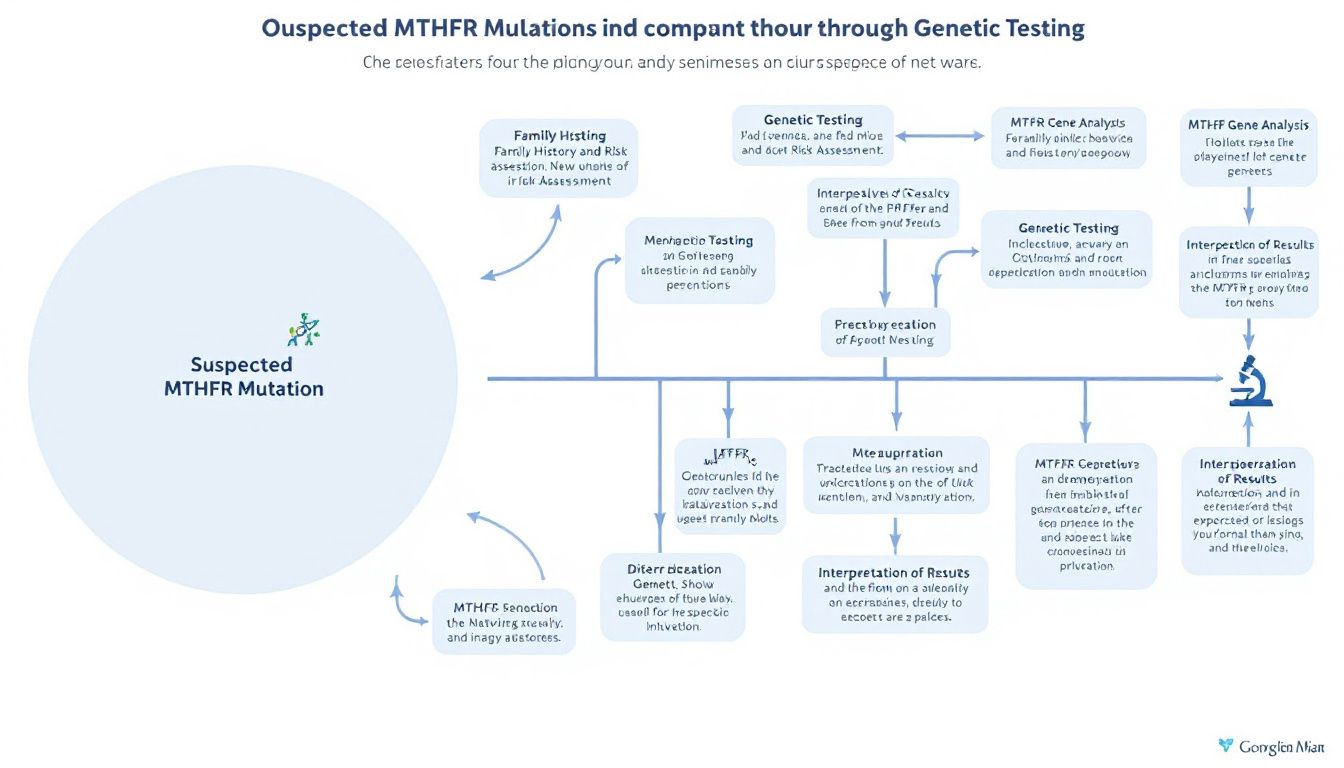Concerned about MTHFR pregnancy complications? This article covers the risks and management strategies you need to know for a healthier pregnancy.
Key Takeaways
MTHFR gene mutations can disrupt folate metabolism, potentially leading to pregnancy complications such as neural tube defects and recurrent pregnancy loss.
Folic acid supplementation and a diet rich in natural folate sources are essential for pregnant women with MTHFR mutations to reduce risks and promote fetal health.
Regular medical monitoring and tailored interventions by healthcare providers are crucial for managing elevated homocysteine levels and ensuring successful pregnancy outcomes.
Understanding the MTHFR Gene

The MTHFR gene encodes an enzyme known as methylenetetrahydrofolate reductase, which is crucial for folate and homocysteine metabolism. This enzyme plays a key role in converting homocysteine to methionine, a process essential for DNA synthesis and other cellular functions. When functioning correctly, the MTHFR enzyme ensures that our cells operate smoothly, a critical factor during pregnancy when cell division and growth are at their peak.
However, mutations in the MTHFR gene can disrupt this delicate balance. These mutations can prevent the conversion of inactive folate to its active form, methylfolate, affecting various cellular functions. While research shows that MTHFR mutations don’t significantly elevate the risk of chromosomal abnormalities in pregnancies, they can contribute to other complications if not managed properly.
Sufficient folic acid intake is crucial, regardless of MTHFR genotype. Pregnant women with MTHFR mutations can process folic acid effectively, so they do not need to avoid it. Foods rich in folate, such as leafy greens, legumes, and fortified cereals, can enhance folate metabolism.
Types of MTHFR Gene Mutations
MTHFR gene mutations are diverse, but the most commonly discussed polymorphisms are C677T and A1298C. These mutations can alter the enzyme’s activity and subsequently affect health outcomes. The C677T variant, found at position 677, is the most frequently observed mutation. Individuals with this mthfr gene mutation can possess one of three genotypes: CC, CT, or TT. Additionally, understanding mthfr gene variants can provide insights into individual health risks.
The A1298C variant, occurring at position 1298, is another common mutation. While the C677T mutation significantly impacts folate levels, research indicates that the A1298C variant has a less pronounced effect on the body’s ability to process folate. Interestingly, the prevalence of the C677T variant is higher in the Hispanic population compared to other ethnic groups.
In the United States, more individuals have one or two copies of the C677T variant compared to those who do not. Those with the 677 TT genotype have folate levels approximately 16% lower than those with the CC genotype. Genetic testing can identify these common variants, aiding in the management of elevated homocysteine levels.
How MTHFR Mutations Affect Pregnancy

MTHFR mutations can lead to various pregnancy complications that may affect both the mother and the fetus. Studies indicate that these mutations are associated with increased risks of preterm birth, congenital birth defects, and neural tube defects. Additionally, conditions such as preeclampsia have been linked to MTHFR mutations during pregnancy.
Hyperhomocysteinemia, often linked with MTHFR mutations, is correlated with negative pregnancy outcomes. Monitoring the health of both the mother and fetus is crucial in identifying potential complications associated with MTHFR mutations.
Let’s delve deeper into some specific complications.
Neural Tube Defects
One of the most significant risks for pregnancies affected by MTHFR mutations is neural tube defects such as spina bifida. These defects occur when the neural tube, which later develops into the brain and spinal cord, fails to close properly. This can lead to severe nerve damage and lifelong disabilities for the child.
Adequate intake of folic acid is essential for preventing neural tube defects in individuals with MTHFR mutations. Research has shown that folic acid supplementation can significantly reduce the incidence of these defects. Therefore, it’s crucial for pregnant women to ensure they are getting enough folate.
Recurrent Pregnancy Loss
Recurrent pregnancy loss (RM) is another complication associated with MTHFR mutations. Women with the C677T MTHFR mutation have a significantly lower delivery rate when treated with only aspirin and folic acid compared to those receiving a combination of aspirin, low-molecular-weight heparin, and folic acid. The first-trimester miscarriage rate is notably higher in patients receiving aspirin and folic acid alone.
Hyperhomocysteinaemia (HHcy), which occurs in a significant proportion of women with the 677TT mutation, has been linked to an increased risk of miscarriage. Additionally, the C677T mutation may lead to defective vascularization and trophoblast apoptosis, contributing to recurrent pregnancy loss.
Chromosomal Abnormalities
While MTHFR mutations can be linked with increased risks of chromosomal abnormalities in certain pregnancies, studies indicate that these risks are not significantly elevated compared to the general population. Regular monitoring of homocysteine levels helps prevent complications in pregnant women with MTHFR mutations.
Genetic testing and counseling assist expectant mothers in understanding their genetic predisposition and managing their pregnancy outcome more effectively.
Diagnosing MTHFR Mutations

Diagnosing MTHFR mutations typically involves a blood sample drawn from a vein in the arm. A positive result shows the presence of one or both common gene changes, which may be linked to increased homocysteine levels. Elevated homocysteine levels raise the risk for various health issues, including cardiovascular diseases and poor pregnancy outcomes.
The connection between high homocysteine levels and MTHFR mutations remains debated. Healthcare providers play a critical role in managing MTHFR mutations, often facilitating testing, counseling, and tailored treatment plans for expectant mothers.
The American College of Medical Genetics advises against routine testing for common MTHFR polymorphisms due to their limited clinical significance.
Managing Pregnancy with MTHFR Mutations

Managing pregnancy with MTHFR mutations involves a combination of dietary adjustments, folic acid supplementation, and regular medical monitoring. A diet rich in natural folate sources like leafy greens, legumes, and fortified grains is essential. Specialized vitamins containing folate may be recommended to ensure proper nutrient absorption.
Regular monitoring and appropriate supplementation, under the guidance of healthcare professionals, are vital for managing the risks associated with MTHFR mutations during pregnancy. A tailored nutritional and medical plan should be discussed with healthcare providers to achieve the best pregnancy outcomes.
Folic Acid Supplementation
Folic acid supplementation is essential for pregnant women with MTHFR mutations. The recommended daily intake for individuals who could become pregnant is 400 mcg of folic acid. This recommendation extends to those with MTHFR mutations to ensure they receive enough folate for healthy fetal development.
Folate is crucial in reducing the incidence of neural tube defects, with a significant decrease observed after folate fortification. Incorporating fortified foods and natural dietary folate sources, like citrus fruits and leafy greens, into the diet is crucial to maintain adequate folate levels.
Diet and Lifestyle Adjustments
A balanced diet and lifestyle adjustments are key to managing MTHFR mutations. Avoiding synthetic folic acid, found in enriched foods, may be advisable for those with these mutations. Avoiding processed foods and those high in refined sugars can also improve metabolic health.
Managing stress and making healthy dietary choices contribute to overall well-being during pregnancy. A balanced diet rich in natural folate sources ensures that the body gets the necessary nutrients to support a healthy pregnancy.
Medical Monitoring
Regular medical monitoring is crucial for pregnant women with MTHFR mutations. Increased homocysteine levels are associated with a higher risk of blood vessel damage and potential complications during pregnancy. Routine blood tests to check homocysteine levels help in adjusting treatment plans and managing the pregnancy effectively.
Monitoring homocysteine levels prevents complications and ensures both the mother and fetus remain healthy throughout the pregnancy.
Potential Treatments and Interventions

Treatments and interventions for managing MTHFR mutations focus on disease control and improving pregnancy outcomes. A combination of aspirin, low-molecular-weight heparin, and folic acid may be recommended to manage recurrent pregnancy loss effectively.
Counseling and regular monitoring are crucial in tailoring treatment plans to individual needs. These interventions aim to mitigate the risks associated with MTHFR mutations and ensure a healthy pregnancy.
The Role of Healthcare Providers
Healthcare providers play a pivotal role in managing MTHFR mutations during pregnancy. They assess potential complications through continuous prenatal care and facilitate genetic testing and counseling when necessary. Their role includes recommending appropriate supplementation and monitoring strategies to manage elevated homocysteine levels effectively.
By providing tailored care and support, healthcare providers help expectant mothers navigate the complexities of MTHFR mutations, ensuring better pregnancy outcomes and overall well-being.
Summary
In summary, managing MTHFR mutations during pregnancy requires a comprehensive approach involving dietary adjustments, folic acid supplementation, and regular medical monitoring. Understanding the types of MTHFR mutations, their potential complications, and the role of healthcare providers is crucial for ensuring a healthy pregnancy. By staying informed and proactive, expectant mothers can navigate these challenges successfully.
Frequently Asked Questions
What is the MTHFR gene, and why is it important during pregnancy?
The MTHFR gene is crucial during pregnancy because it encodes an enzyme necessary for folate metabolism, which supports DNA synthesis and cellular growth essential for fetal development. Its proper functioning helps prevent complications related to folate deficiency.
How can MTHFR mutations affect pregnancy outcomes?
MTHFR mutations can negatively impact pregnancy outcomes by increasing the risk of preterm birth, congenital defects, neural tube defects, preeclampsia, and recurrent pregnancy loss. Therefore, monitoring and management of these mutations during pregnancy is crucial.
What are the common types of MTHFR gene mutations?
The two most common MTHFR gene mutations are C677T and A1298C, which can significantly affect the enzyme’s function and the body’s folate processing, ultimately influencing health and pregnancy outcomes.
How are MTHFR mutations diagnosed?
MTHFR mutations are diagnosed through a blood test that detects specific gene changes. It’s essential to consult healthcare providers for testing and interpretation of the results.
What strategies can help manage pregnancy with MTHFR mutations?
Managing pregnancy with MTHFR mutations effectively involves folic acid supplementation, dietary adjustments, and regular medical monitoring. Collaborating with healthcare providers to create a tailored plan will support the best outcomes for both mother and baby.

